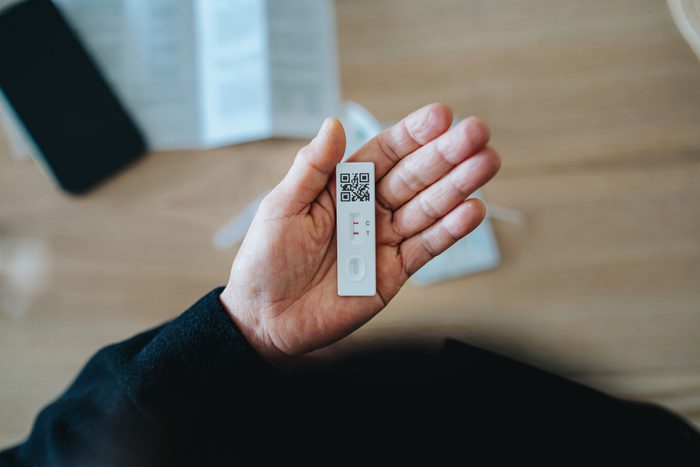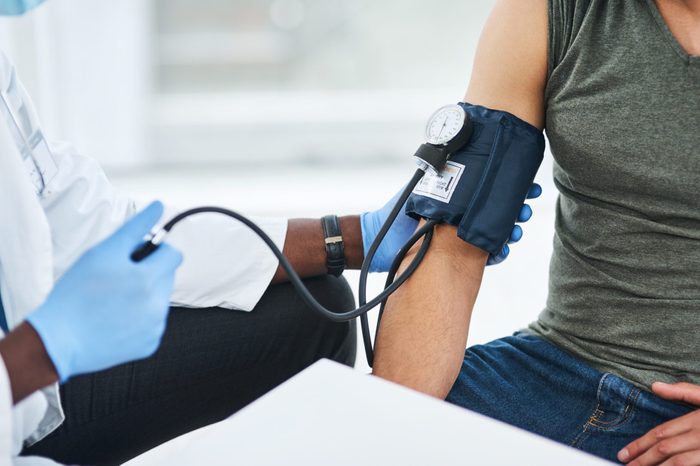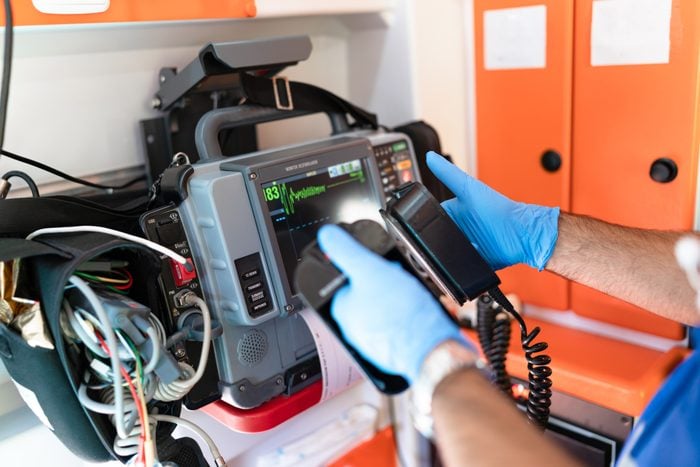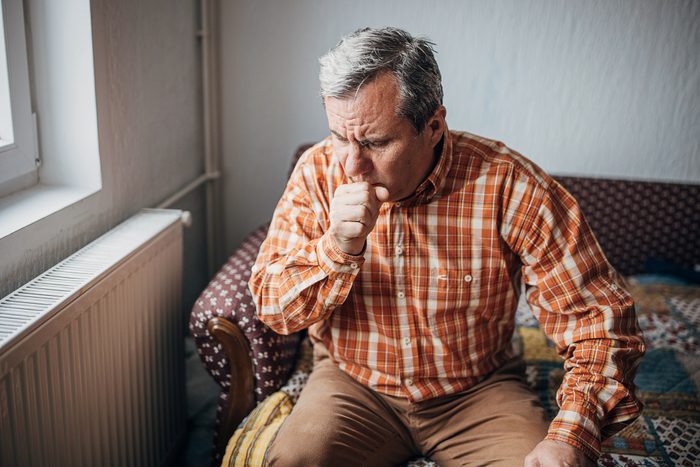
If you suddenly have chest pain, dizziness, and shortness of breath, it’s possible you assume you’re experiencing a heart attack because our society has stressed the heart attack symptoms not to ignore. But while those can be a few symptoms of a heart attack, they may also indicate a rarer condition called myocarditis—especially if those cardiac symptoms are accompanied by cold and flu symptoms. Myocarditis is a rare heart condition, affecting only one to 100 people out of 100,000 each year in the US, according to John Hopkins University.
“This is an illness that is occasionally encountered but poorly understood, even within the medical community,” says Ronald G. Grifka, MD, a cardiologist and chief medical officer at the University of Michigan Health-West. This is largely due to the fact that myocarditis symptoms can vary from person to person and be caused by many different things—in fact, 90% of cases are “idiopathic,” meaning they have no known origin, he adds.
“It is important for people to know about myocarditis, as it is often mistaken for other heart conditions, including pericarditis, heart disease, and heart attack,” he says.
This Zero-Calorie Sweetener Was Just Linked to Heart Attack and Stroke

What is myocarditis?
The heart is a muscle and, just like any other muscle in your body, can become inflamed. Myocarditis is the medical condition when the heart muscle (called the “myocardium”) becomes inflamed.
Cases can range from mild to quite severe—and, in some cases, fatal. Myocarditis can be acute, meaning it comes on suddenly and lasts for a few days or weeks; or it can become a chronic condition, flaring up months or even years after the initial event.
It can affect people of all ages…but those who have an existing illness and those who are over age 50 are at a higher risk.

What causes myocarditis?
This type of inflammation of the heart muscle can be caused by a variety of factors. Dr. Grifka says the most common is a viral infection. “Think of it this way: For some people, a viral infection causes inflammation of the nose and mouth—a ‘cold.’ Others get inflammation of the GI tract, resulting in vomiting and diarrhea. But in some people, that virus will cause inflammation of the heart muscle, and that’s myocarditis,” he explains.
It’s not just a viral condition however, says Jennifer Haythe, MD, a critical care cardiologist, associate professor of medicine in the Center for Advanced Cardiac Care at Columbia University Irving Medical Center, and co-director of the Columbia Women’s Heart Center. Dr. Haythe says myocarditis can also be caused by bacterial or fungal infections, autoimmune diseases, exposure to toxins, chest trauma, and adverse reactions to certain medications.
Women’s Autoimmune Diseases: Doctors Share 3 Reasons They’re So Common

Myocarditis and COVID-19
One of the more surprising findings to come out of the ongoing research into the COVID-19 pandemic is how both the SARS-CoV-2 virus and, to a lesser extent, the vaccines, can increase the risk of myocarditis.
“There’s a lot we still don’t understand about the connection, but what we do know is that the COVID virus can cause several cardiac complications including myocarditis and heart failure syndromes,” says Dr. Haythe.
These issues may persist even after you recover, she says. Scientists are still researching the long-term cardiac implications of a prior COVID infection—but a recent study, published in the JAMA Cardiology (a journal of the American Medical Association), suggests the damage may be significant. Researchers looked at cardiac MRIs of recently recovered COVID patients and found cardiac involvement in 78% and ongoing inflammation in 60%, both of which may increase the risk for a heart attack. They found these complications even in younger patients who reported milder symptoms of the disease and in people who tested positive but were never hospitalized.
How To Exercise After Covid-19: Lung and Exercise Science Doctors Share the Current Wisdom

Symptoms of myocarditis
How do you know if you have this rare condition? Our experts share the myocarditis signs to look out for.
(Note: Some people with myocarditis may not have any symptoms at all, and the condition may only be discovered during routine testing or evaluation for other medical conditions.)
Chest pain
Pain in the chest—often described as pressure or squeezing—is the most common symptom of myocarditis, says Dr. Haythe. This chest pain can be mild or severe and is typically located in the center or left side of the chest and may radiate to the neck, arms, jaw or back.
Got chest pain? See a doctor immediately. “It usually isn’t possible to tell on your own whether your chest pain is a heart attack, myocarditis, or something else,” says Dr. Haythe. “Always get any chest pain evaluated.”

A big change in your blood pressure
Pay attention to unexpected spikes or drops in your blood pressure, says Dr. Haythe. Myocarditis in the inflammatory phase can cause an increase in your blood pressure as your immune system fights the infection. But over time, as the muscle becomes damaged and less able to function, you may see a drop in your blood pressure.

Fever
A low-grade fever—below 101°F (38.3°C)—is a common symptom of cases of myocarditis caused by an infection of some kind. A fever occurs when the immune system is activated to fight off the infection or inflammation. A high or rapidly increasing fever is a red flag of an infection that’s progressing quickly and should be taken seriously, says Dr. Haythe.

Body aches
An inflamed heart muscle is a compromised heart muscle and therefore is less able to circulate oxygenated blood properly, says Dr. Grifka. You may feel this as all-over achiness or muscle soreness. Body aches also often come with a fever.

Swelling in the lower body
Swelling, bloating, and retaining water is another red flag of declining heart function. When your heart isn’t pumping efficiently, it can cause blood pooling in your legs, feet, and ankles, says Dr. Grifka. This symptom is more common in people who have myocarditis as a complication of other illnesses, like liver or kidney disease.

Light-headedness
Less oxygen to your brain often translates to feeling light-headed, dizzy, or even fainting and losing consciousness. Myocarditis that has damaged the heart muscle can also lead to a drop in blood pressure, which in turn can make you faint.

Fatigue
Fatigue—ranging from unusual tiredness to complete exhaustion—is another consequence of reduced heart function. “When the heart muscle is inflamed, it does not contract, or ‘squeeze,’ as strongly and that can manifest as fatigue,” says Dr. Grifka. “Extreme fatigue is an early sign that heart failure may occur.”

Difficulty breathing
In the same vein, less oxygenated blood circulating through your body leads to difficulty breathing, ranging from a shortness of breath during exertion to a severe feeling of being unable to catch your breath, says Dr. Grifka. You may experience “air hunger,” causing your to gasp or gulp air.

Rapid heart beat
Heart palpitations or an abnormally rapid heartbeat (tachycardia) can happen as the heart muscle tries to compensate for its reduced function, says Dr. Grifka.
Note that this feeling is often mistaken for anxiety or a panic attack—but if you experience this symptom with any other symptom on this list, it’s a sign that it’s not just anxiety and you should seek help.

Vomiting or diarrhea
Occasionally myocarditis can cause gastrointestinal distress, including a feeling of intense nausea, stomach pain, vomiting, or diarrhea, says Dr. Grifka. This may be related to the effects of the inflammation on the heart muscle or may be due to the underlying viral or bacterial infection.

Heart failure
It’s rare but in severe cases, myocarditis can cause a heart attack or heart failure, which can be fatal. Make sure you know the symptoms of a heart attack and seek treatment regardless of what you think the underlying cause may be, says Dr. Haythe.
This Is Exactly What to Do If You Think You’re Having a Heart Attack

Treatment for myocarditis
Treatment myocarditis usually depends on resolving whatever underlying condition is causing the inflammation—if it’s able to be identified. If not, treatment focuses on supportive care, such as rest and medication to relieve symptoms. In some cases, more aggressive interventions such as immunosuppressive therapy or a heart transplant may be necessary.
However, most cases of myocarditis are not that severe and will start to resolve on their own with home care and anti-inflammatory OTC medicines like ibuprofen and naproxen, Dr. Grifka explains.
“On rare occasions, the heart muscle can be so damaged that it will not recover normal function, resulting in persistent and progressive symptoms due to very weak heart function,” he adds. “This is why it’s important to note if you have the symptoms mentioned, if they persist for more than two or three days, or become progressively more severe, you should seek medical treatment.”

Preventing myocarditis
This condition can’t be totally prevented but our experts say there are some things you can do to lessen your risk. First, take measures to decrease your risk of catching an infection, including washing your hands properly, wearing masks when in high-risk situations, and staying current on all your vaccines. Second, manage all of your cardiac risk factors like diabetes, hypertension, obesity, and cholesterol levels. Third, stay on top of any chronic illnesses you may have, particularly those that affect the immune system.
“Being as healthy as you can be overall is the best defense,” says Dr. Haythe.
For daily wellness inspiration, get The Healthy @Reader’s Digest newsletter and follow The Healthy on Facebook, Instagram, and Twitter. Keep reading:

